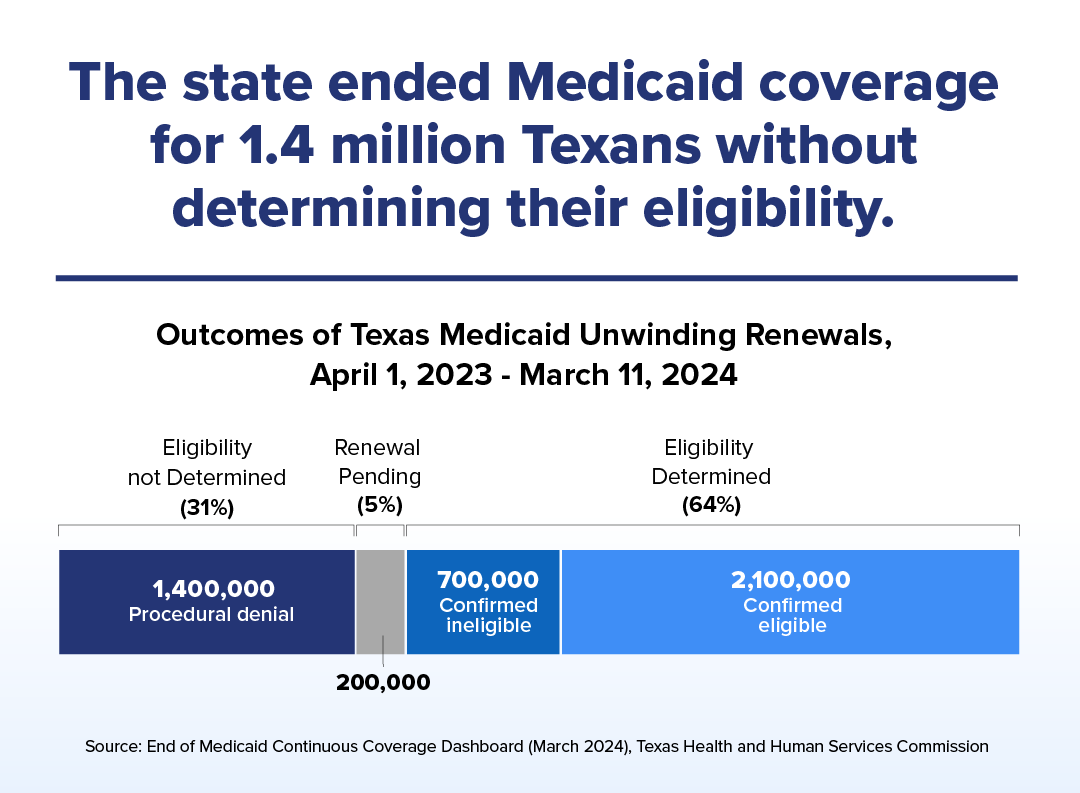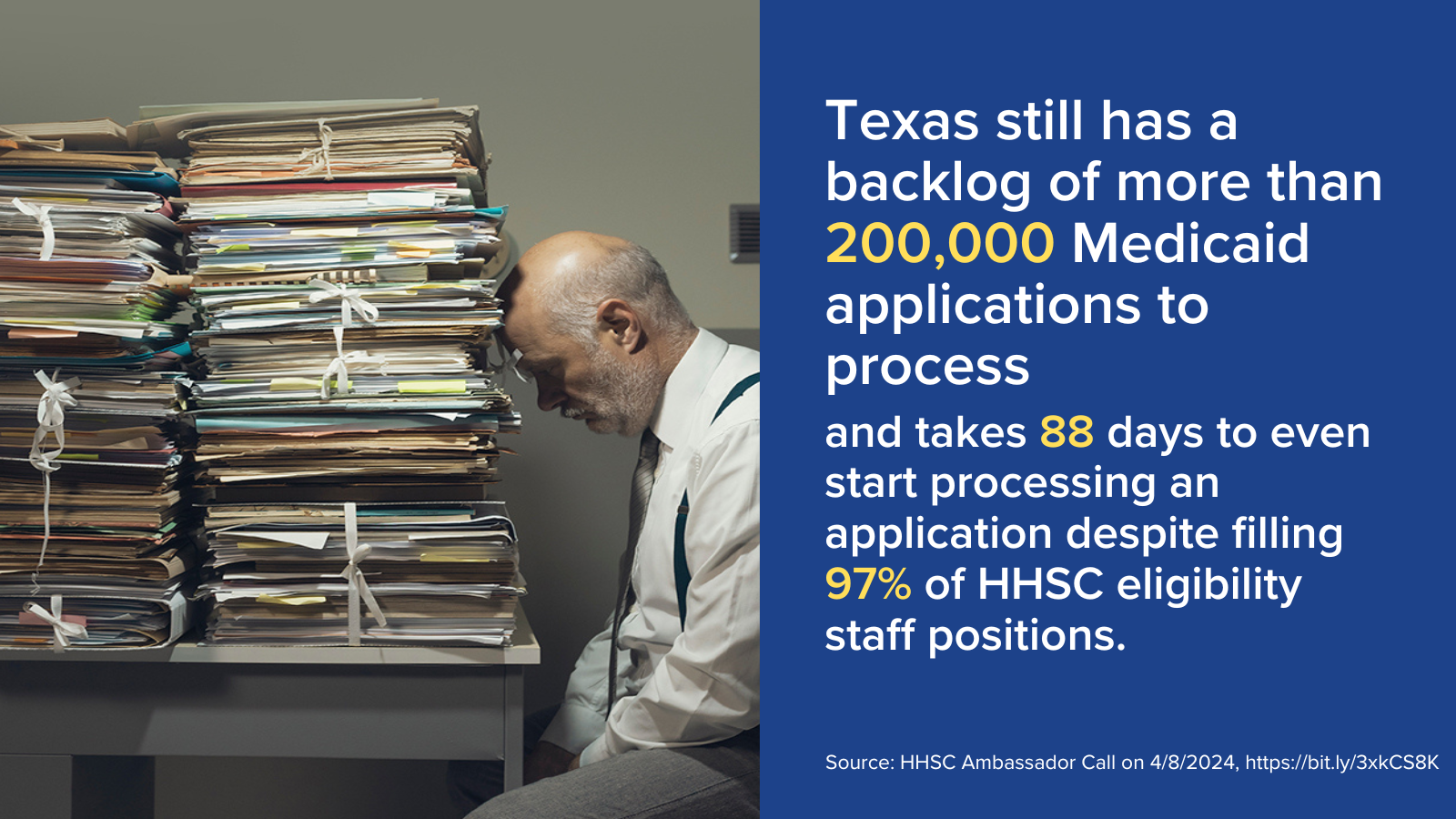
Texas is in the final stages of reviewing Medicaid eligibility for 5.9 million Texans as part of the “unwinding” of Medicaid rules that allowed enrollees to maintain their health insurance without renewing it during the pandemic. Many women and kids on Medicaid were no longer eligible by the end of the pandemic, so they were supposed to lose coverage during the unwinding. However, there are a number of challenges with the state’s enrollment system, and we are concerned that the state removed many Texas kids through procedural denials who were likely still eligible and should not have been removed. For example, the Texas Tribune recently profiled a five-year-old from McKinney with brain cancer who temporarily lost his Medicaid coverage and his nursing care last year, even though he was still eligible for Medicaid.
Moving forward, the Legislature has opportunities to push Texas from the current inefficient enrollment system—which is overly reliant on paperwork and manual procedures—to a more efficient and modern system that uses technology and data. A more effective system will help ensure that families whose children are eligible for health insurance are able to sign up or renew their coverage in a timely manner and get the health care they need. In the coming months, the Texas Senate will have an opportunity to explore these challenges and opportunities in response to the health coverage interim charge issued by Lieutenant Governor Dan Patrick.
TWO MILLION TEXANS WERE REMOVED FROM MEDICAID DURING THE UNWINDING.
According to data released in April 2024 by the Texas Health and Human Services Commission (HHSC), the state removed slightly more than two million Texans from Medicaid health insurance during the unwinding. That includes almost 1.4 million who were “procedurally denied” — double the 700,000 who were confirmed ineligible and appropriately removed. Another 2.1 million Texans went through the renewal process during the unwinding and successfully kept their Medicaid coverage.
Most Texans enrolled in Medicaid are children — and most of the Texans removed from Medicaid were children. In fact, of the 1.4 million procedural denials, one million had Children’s Medicaid (including those who turned 19 and no longer qualify). We’re concerned about children who may miss out on checkups, immunizations, physical therapy for disabilities, medications to keep them healthy, mental health treatment, and other care because they lost their coverage. Another 350,000 kids with Children’s Medicaid were removed after they were confirmed ineligible.
We are particularly concerned about procedural denials. In these cases, the state did not finish confirming if the enrollees were eligible before removing them from Medicaid. Procedural denials happen when a Medicaid enrollee does not complete every step in the renewal process, often because the state sends renewal information to the wrong address or people encounter other paperwork barriers in the process. In other cases, procedural denials can occur when people who are no longer eligible choose not to return their paperwork. The Texas rate of completed renewals that resulted in a procedural denial (35 percent) is well above the national average (22 percent) — a symptom of the state’s overreliance on paperwork and staff and underuse of technology and data.

UNWINDING EXPOSED AND EXACERBATED PROBLEMS LINKED TO THE STATE’S OVERRELIANCE ON MANUAL PROCESSES AND UNDERUSE OF DATA.
There were delays and problems with the eligibility system before the unwinding, but the unwinding exacerbated and exposed those problems. Texas has repeatedly missed opportunities to upgrade and streamline the state’s eligibility system, resulting in a system that is overly reliant on state eligibility workers instead of using technology. Currently, applications and renewal forms that Texans fill out online must be re-entered into the system manually by eligibility staff, creating unnecessary delays that could be reduced if HHSC used technology that did not require staff to manually input information.
During the unwinding, Texas came in second-to-last in the nation in the use of administrative, data-driven renewals (known as “ex parte” renewals). These renewals reduce paperwork and delays, improve accuracy, and help currently eligible kids stay renewed. Almost every other state is using this process more efficiently than Texas. While Texas used these data-driven renewals in only 10 percent of cases in which enrollees were determined eligible, Louisiana, Connecticut, Kentucky, Hawaii, Washington, Rhode Island, Arizona, and North Carolina, for example, used data to determine eligibility in 80 to 99 percent of cases. If more renewals were handled preemptively using available data through the ex parte process, applicants would not have to wait for an eligibility worker to process their renewal manually, and the backlog and delays would decline. As noted above, the rate of procedural denials in Texas was also well above the national average.
AFTER THE UNWINDING, TEXAS FAMILIES ARE STILL FACING LONG DELAYS FOR MEDICAID APPLICATIONS — EVEN THOUGH HHSC HAS STAFFED UP.
Families who have Medicaid-eligible children and are doing everything right with their applications are still running into unintended barriers and delays in getting the health care and food they need.
As of March 29, 2024, Texas families were still waiting 88 days for an eligibility worker to begin processing their Medicaid applications, resulting in a backlog of 208,129 applications. The state is processing SNAP applications for food assistance a bit faster, at 42 days, but still has a large backlog of applications, at 89,694, leaving families wondering how they will feed their children.
Meanwhile, HHSC has made significant efforts to fill and keep eligibility workers. Worker retention is at an all-time high of 97 percent, and workers have had mandatory overtime of an additional 20 hours/week for over a year now.
In other words, due to the state’s underuse of technology and data, families are still waiting almost three months for their application for health insurance to reach a worker despite record staff retention and mandatory overtime.

TEXAS LEADERS SHOULD ENSURE THAT CURRENTLY ELIGIBLE CHILDREN ARE ABLE TO SIGN UP FOR HEALTH COVERAGE.
Texas has the worst uninsured rate in the nation for kids, with children’s uninsured rates in the Abilene, Beaumont, Brownsville, DFW, El Paso, Houston, Laredo, Longview, McAllen, Midland, Sherman, and Waco metro areas all more than twice the national average.
But data in the recent Texas 2036 report show that nearly half of uninsured kids in Texas are eligible for Medicaid or CHIP health insurance — meaning that state leaders could slash the state’s uninsured rate, and get more kids connected to the health coverage they need, by simply improving the enrollment process for currently eligible kids. Additionally, families participating in focus groups for the report stated that they were able to see doctors and get needed prescriptions, leading to high satisfaction with their experience while enrolled in Medicaid and CHIP. However, the same families reported the application and renewal process was cumbersome and difficult to navigate.
THE LEGISLATURE SHOULD INVEST IN TECHNOLOGY AND IMPROVE THE USE OF DATA-DRIVEN TECHNIQUES FOR DETERMINING ELIGIBILITY RATHER THAN RELYING SO MUCH ON PAPERWORK.
Texas needs a more efficient, accurate approach to Medicaid/CHIP enrollment that reduces delays, increases the use of smart, data-driven processes, and improves manual processes. Below are policies and investments to do this.
Pass legislation to establish “express lane” eligibility so that HHSC can use already-verified information, such as a child’s enrollment in SNAP, as an indicator for Medicaid and CHIP eligibility. During the 2023 legislative session, this bipartisan bill by Representative Bucy, Harless, Jetton, Oliverson, and Bonnen overwhelmingly passed the Texas House but did not pass the Senate. Express lane eligibility would help increase the number of eligible kids enrolled in Medicaid by a projected 100,000 kids by the end of 2026 (according to the fiscal note).
Make investments to upgrade the technology within the Texas Medicaid eligibility system:
Invest in 2-1-1 call centers and infrastructure by adding a call-back option and adding after-hours and weekend options for eligibility help;
Modernize eligibility and enrollment processes, including YourTexasBenefits website; and
Fix all known errors that HHSC has identified in the state’s technology and eligibility system.
We look forward to working with legislators, HHSC staff, families, and other interested Texans to make these important changes.



